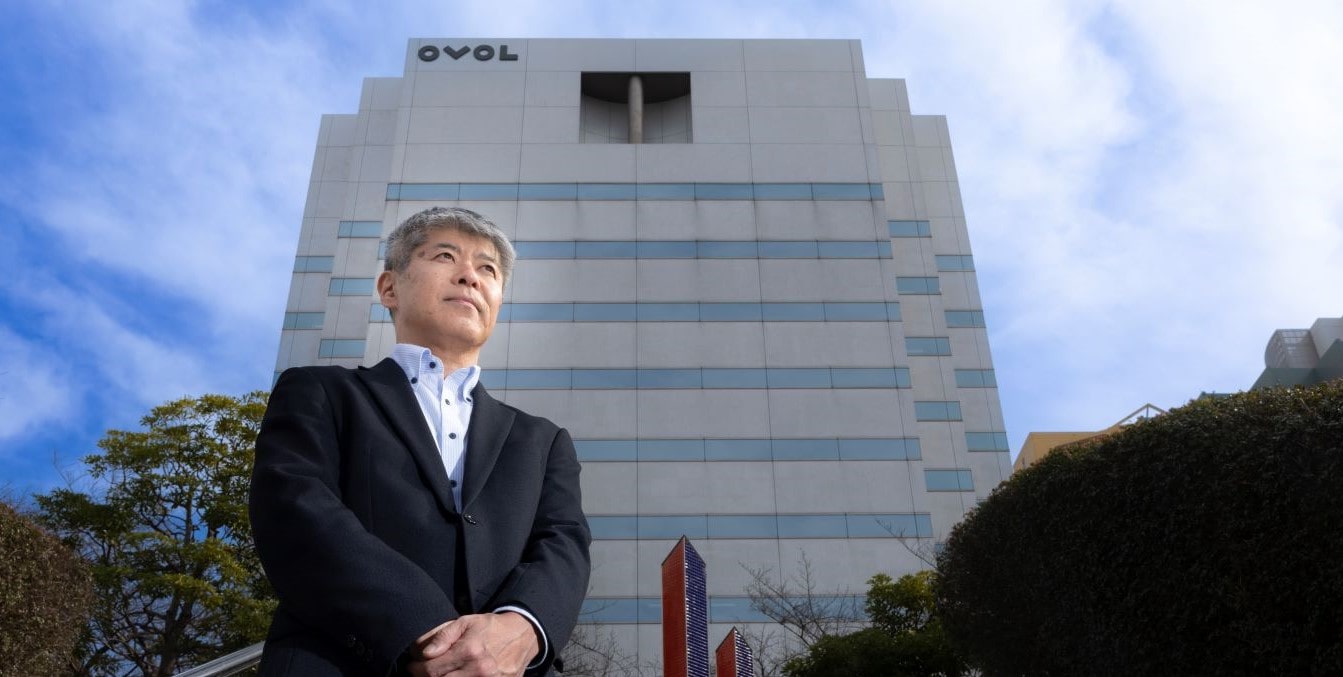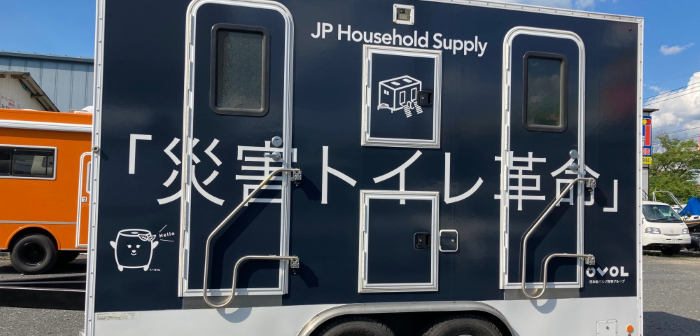
Toilet Trailer Business to Solve Social Issues Demonstrates Our presence as a Driving force for the Widespread Adoption of the Business
On January 1, 2024, a large earthquake struck the Noto Peninsula in Ishikawa Prefecture. While Damages to lifelines including water and power outages continued to affect the area, JP Household Supply, a group company of Japan Pulp & Paper that sells household paper and sanitary products, dispatched its own demonstration model ”Toilet Trailer” to Wajima City, Ishikawa Prefecture and also delivered drinking water and toilet rolls. JP Household Supply regards the sale of the Toilet Trailer as a business that can help solve social issues, and is working to spread the use of the Toilet Trailer throughout Japan.

JP Household Supply Co., Ltd.
Enhancing product development capabilities through synergies within the group, and also aiming to solve social issues
JP Household Supply was established as an independent company in 1985, when the Household Paper Sales Division separated from Japan Pulp & Paper. One of JP Household Supply's unique characteristics is its strong product planning capabilities. Since acquiring a patent for the development of ”No Core,” a resource- and environment-friendly coreless toilet paper, JP Household Supply has been planning and marketing unique products that go beyond the boundaries of household paper, such as eco-friendly paper cat litter. In one case, the company teamed up with the Corelex Group (related article: Working Together to Build a Circular Economy That Makes the Most of Local Resources), a manufacturer of recycled toilet paper that is also a member of the Japan Pulp & Paper Group, to commercialize the product.
JP Household Supply's activities are not limited to household paper. In order to be close to people's daily lives, JP Household Supply is engaged in businesses that address social issues in both everyday and emergency situations. For example, regarding everyday situations, the company supports the activities of the ”Chemical Sensitivity Support Center,” which assists people suffering from chemical sensitivity and fragrance pollution, as well as the ”Ashinaga Scholarship Society,” which supports children who have lost a parent due to illness or disaster, and children from families where parents are unable to work due to disabilities, through the three pillars of scholarships, educational support, and psychological care. In the event of a disaster, JP Household Supply dispatches its own toilet trailers to the affected areas to serve as mobile toilets in a network that protects and connects lives from disasters. In addition to building an ”Earthquake Disaster Toilet Network” to support the dispatch of Toilet Trailers owned by local governments to disaster areas, JP Household Supply is also actively promoting the spread of ”stockpile-able toilet paper“ and other activities.
Toilet Trailers obtain “Comfortable Toilet" Certification
The toilet trailer business was originally introduced to Japan Pulp & Paper by one of the group's U.S. offices. The business began because JP Household Supply was originally in the household paper business. In the aftermath of the Kumamoto earthquake in 2016, the company dispatched toilet trailers to the area to assist victims who were unable to use toilets.
The Toilet Trailer’s mobility is their greatest feature. They can be moved by a towing vehicle and are ready for use in approximately 10 minutes after arriving at the site. As standard, each trailer has four private restrooms, some equipped with hot-water functions and heated toilet seats. A solar panel installed on top of the vehicle recharges the built-in battery, so the restrooms are well-lit and safe to use even at night. The ”Comfortable Toilet“ was certified by the Ministry of Land, Infrastructure, Transport and Tourism in recognition of users' comments that it dispelled the negative image of conventional temporary toilets.
In response to the Noto Peninsula earthquake, JP Household Supply dispatched a Toilet Trailer to the area on January 8, and it was Mr. Hasegawa that accompanied the trailer to the site. Mr. Hasegawa, who transferred to JP Household Supply from Japan Pulp & Paper in 2022, had never heard of Toilet Trailers until his transfer. He had only dealt with private companies before, so he had to get used to the various procedures involved in signing a contract with local governments. Even after successfully concluding a contract, there are ancillary tasks such as the selection of wrapping design and registration procedures such as garage certification. After a year of understanding the entire flow of Toilet Trailer sales, Mr. Hasegawa was just getting into the swing of things when the Noto Peninsula earthquake struck.

Widespread Use of Toilet Trailers Solves Social Issues
In response to the Noto Peninsula earthquake, local governments collaborated to dispatch Toilet Trailers to the affected areas. The company's Toilet Trailer was first dispatched to Wajima City. Mr. Hasegawa also followed the Toilet Trailer to the site on his own to explain its use. The road had cracks and sinkholes, forcing a detour, and the car navigation system did not work at all. When he finally made it to the designated evacuation shelter by relying on traffic signs, most of the portable toilets that had been installed were Japanese-style squat toilets and the conditions were harsh: cramped, dark, dirty, and smelly. The arrival of the Toilet Trailers was greatly appreciated by disaster victims and aid workers, as holding off going to the toilet can lead to illness and even disaster-related deaths. “Until then, I had heard many comments of delight from people who had used the Toilet Trailers at events such as marathons, saying that they were spacious, bright, clean, and odor-free, but I realized even more strongly that the toilet problem directly affects human lives. It was the first time I had seen a Toilet Trailer actually help solve the social issue of toilet problems during disasters.” (Hasegawa) Furthermore, he was reminded that the private rooms of the Toilet Trailers are spacious, so even children and elderly people who need assistance can use them with ease.
-
 Self-Defense Forces Personnel Supply Water to Trailers Following the Noto Peninsula Earthquake
Self-Defense Forces Personnel Supply Water to Trailers Following the Noto Peninsula Earthquake
Mr. Hasegawa visited the Noto Peninsula three times to support the earthquake-affected areas. When the decision was first made to travel to Wajima City, Mr. Hasegawa says he was so anxious that he could not sleep. Later when trailers from other local government were dispatch to Nanao City and Suzu City, Mr. Hasegawa accompanied them there of his own volition. “Each time I went, I became more aware of the importance of delivering the trailers safely. I was cheered up and encouraged by the bright smiles of the people waiting for Toilet Trailers at the site. Despite being affected by the disaster themselves, some people volunteered to care for residents in the same area, and I had the utmost respect for their efforts.” (Hasegawa)
A Toilet Trailer was dispatched to Nanao City from Asaka City in Saitama Prefecture. Asaka City's Toilet Trailer is owned by Marunuma Soko in the city, a local company, and operated by Asaka City under an agreement. Asaka City has been raising awareness about emergency preparedness by displaying the Toilet Trailer at various events such as disaster prevention fairs, but this was the first time for the city to send a Toilet Trailer to an actual disaster area. Mr. Onozawa, Asaka City Deputy Director-General and Director of the city’s Crisis Management Office said,”Mr. Hasegawa gave us easy-to-understand instructions on how to use the Toilet Trailers at the site, so we were able to respond smoothly. The people who actually used the Toilet Trailer liked it, and when they said, 'Thank you,' we felt very happy that we had dispatched the trailer.
At evacuation centers in the Noto area where approximately 30,000 people were huddled together, Toilet Trailers purchased by local governments from JP Household Supply arrived one after another from all over the country, from Hokkaido to Kyushu. as of February 8, 26 Toilet Trailers are in operations to provide support to disaster-affected people. This also brought about a change in Mr. Hasegawa's mindset. “Until then, I had a great sense of accomplishment when JP Household Supply without delay. However, dispatching the trailers to disaster-affected area gave me the most rewarding experience of being of service to everyone” (Hasegawa).
-
Disaster Dispatch Departure Ceremony. Mr. Hasegawa is second from the right.

To realize both economic value and social value
Mr. Hasegawa is also mindful that awareness of the Toilet Trailer as a ”toilet for disasters“ is increasing. He says, ”The growing number of inquiries has strengthened our desire to deliver the system to as many communities as possible by the end of this year. Until now, the introduction of these systems has been mainly at the municipal level, but we expect to see them introduced at the national and prefectural levels in the future.” JP Household Supply's goal is not just to increase the number of units and spread them throughout the country. The company is also looking to build a scheme to dispatch Toilet Trailers to the right places at the right time and ensure that they are operated without delay. Close cooperation with local governments and other organizations will be indispensable for this. In addition, as the number of vehicles increases, maintenance will naturally be required to keep up with the increase. The company plans to establish a nationwide system to cover inspections, vehicle inspections, maintenance, and other services.
Mr. Hasegawa seems to be getting a good stimulus from his interactions with local government officials involved in the Toilet Trailer business. “Through conversations with officials who take self-help and mutual aid seriously, I strongly feel that the Toilet Trailer business is a business that supports local self-help and mutual aid and contributes to local communities. I also understand that JP Household Supply's focus on sustainability is linked to the activities of the Japan Pulp & Paper Group as a whole” (Hasegawa). Japan Pulp & Paper Group has identified 12 material issues as internal and external factors that have a significant impact on the realization of sustainable business activities that combine both economic and social values.
JP Household Supply is in a leading position because it has acquired the design rights to the Toilet Trailers. However, as it expands this business, it is inevitable that competition will emerge. In order to become the ”company of choice“ in such a situation, it is even more necessary to be a company that also responds to social issues. Mr. Hasegawa concluded with passion, “That is why this project is so significant, and we hope to make a greater appeal to society.”
Information in OVOL Insight is current as of the date of publication.
Please note that this is subject to change without notice.
Date of Publication: June 4, 2024









